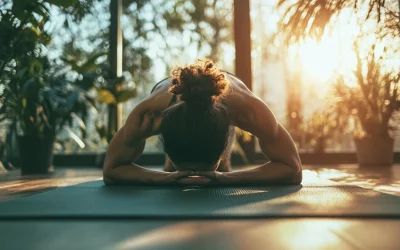When was the last time that you allowed yourself to relax? Not just mindlessly scrolling on your phone for hours, but giving yourself a break and feeling so calm that the tension melted out of your shoulders. If you can’t remember the last time you relaxed, you’re not alone. Many countries pride themselves in their culture of overworking to the point where you can feel ashamed if you’re not constantly hustling.
It’s not healthy to constantly strive for productivity, though.
Why is relaxing important?
Relaxing is how your body repairs, recovers, and processes, a lighter version of what sleep does for us. It reduces stress and depression, and it helps to prevent burnout, too. Relaxation encourages creativity, reduces illness, and it allows us to enjoy life.
Regularly slowing down also helps to improve your relationships. It strengthens your patience and improves your self-love (which reflects back to the people around you.) It allows you the ability to pause before you react to someone, instead of blowing up because you’re feeling overwhelmed.
It’s not uncommon for someone to overwork themselves, suppressing emotions instead of dealing with them, since they’re worried that if they start, they won’t be able to stop, and they’ll break down completely. Often, though, they’ll come across a minor snag in their plans and lose their cool.
Instead, allow yourself regular opportunities to relax and process difficult emotions. Not only will this improve your overall health, but sharpen your thinking and creativity skills!
Why can it be hard to relax?
You feel like you have too much on your plate.
Whether your to-do list is about 3,000 things long, you have heavy and serious responsibilities at work, or you are the person making sure that your household runs smoothly, it’s easy to feel overwhelmed by the number of obligations you have. It is important to take a step back for your own well-being.
It may seem like everything will fall apart if you stop for a second and to be fair, it might. That doesn’t mean you need to destroy yourself over it, though.
Ask for help, delegate some of the responsibilities, or let some of your juggling balls fall. If you were incapacitated tomorrow, they may struggle at first, but then they will find a way to work without you. Your physical and mental health should take priority.
Start by looking at your to-do list.
If you had to pick 3 things that absolutely needed to get done, which are they? Is there anything on that list that would simply be nice if they got done or you added them because they are an ideal project that you want to start but have no bearing on your life currently? If so, remove as many things as you can.
This will help you to feel less overwhelmed, make you more likely to finish your list, and give you more time for yourself.
You believe you’ll be looked down upon or shamed for taking time off.
Unfortunately, it’s not uncommon to be surrounded by people who can make you feel bad about taking a break. Whether it’s your manager who doesn’t want you to complain about the unpaid overtime (because if they’re suffering, they want you to suffer too), or a busy family member, it is important to put yourself and your needs first.
Set clear boundaries with your time and effort, such as what your working hours are or not relinquishing your restoration time. Know that any pushback you may receive is often a reflection of their own issues, not yours. Surround yourself with those who encourage you to take care of yourself instead of those who compete to see who can run themselves down to the ground first.
You are somewhere that it isn’t “safe” to relax.
Whether it’s because you’re near someone who will judge you for taking a break or because you’re sitting in an unfamiliar environment, there are certain times that it isn’t “safe” for your body to relax. While these areas can be unavoidable, make sure you find a space where you can be completely at ease.
A good test is to see if you can actively release your shoulder tension and do something such as read or write in a journal. If you can feel loose and are not jumpy about someone seeing you in a personal moment, then you’ve found a good spot.
Keep in mind that our mind is constantly using subconscious triggers to analyze these places around us.
If you’ve ever lived in a college dorm, you might have noticed that it’s hard to completely let go of the concept of being “at school” while on campus- even on the weekends or at night. If you have a dedicated “work” station at home (and it’s a good idea to have just one spot designated for working), avoid doing anything else there, as your mind will be thinking that it is “work” time.
Think of someplace that perpetually feels busy, like Costco. Even if you go at an unusually quiet time, chances are that you will feel overwhelmed and tired after, simply because that’s what your mind associates with the location.
How to start relaxing:
You might be aware of why you can’t relax but don’t know how to improve. This is okay, as the first step to finding a solution is by becoming aware of the issue. Here are some suggestions that you can use to begin loosening up and enjoying downtime.
Associate an action with relaxing to create a mental cue.
This could be something like doing stretching or a meditation session (or both!) as a way to change your thought process and to physically begin the act of relaxation. Stretching physically relaxes your body and meditation calm your mind, which can help you to slow down and enjoy the moment.
Brewing a cup of tea is a great chance to pause. While the water is boiling and the leaves are steeping, use those few moments to prepare for relaxation. Tidy up anything you need to and set up a cozy spot where you can read, chat with a friend, or just cuddle up with a blanket while you look out the window.
Schedule a specific time of day to begin training your internal clock to relax at that time. If you incorporate even just 10-30 minutes into your daily routine, such as when you wake up early with fresh coffee or before you go to bed, your entire day will improve. You’ll begin looking forward to this time- and you might even be able to use it as a bonding time with your loved ones!
Another great trigger is to use a certain song or playlist when you want to relax or focus- and only listen to that song for this purpose. For example, there are a few meditation apps that offer focus music. By starting each workday with the same one, you can enhance your focus and productivity, getting you into the right headspace faster. You can find focus and relaxing playlists on YouTube, Spotify, and Apple Music- basically, anywhere you want to listen!
Find the way that works best for you.
Everyone relaxes differently- some like stillness and quiet while others like doing activities. The key factor is that you are doing something that you enjoy and find fun and is not typically considered “productive.”
- Going for a leisurely walk.
- Spending time in nature.
- Reading a book for fun. (While self-help books are great, they are too “productive”, so read them outside of relaxing time.)
- Creating art, whether that is visual, music, baking, or something else completely.
- Sit in silence or by focusing on the music you’re listening to.
- Watching a movie with someone- without scrolling on your phone or multitasking.
- Stretching or another fun exercise that you enjoy.
- Napping, but more than just a rushed power nap.
- Playing with Lego or other toys.
Physically go to a place where relaxing is the only thing you can do.
Head out to a park or a nature preserve.
You can bring a book, a picnic, a camera, or even a pair of running shoes! Regardless of the activity, you will find yourself relaxing in nature.
Part of why this happens is that the amount of artificial stimulation we are exposed to is reduced. The sounds are expected, the colours flow effortlessly into each other, and natural light is great for our eyes (though, wearing sunglasses helps to reduce UV damage from the sun). Fresh air invigorates our lungs and our bodies function better without artificial heating or cooling.
Find a cozy coffee shop or library.
While not all cafes or libraries are equally relaxing, many places that offer couches are designed to be soothing. Find a location where you like the vibe and that you feel comfortable in. While you might be able to do work in these locations, strive to avoid it by bringing a fun book to read, a journal, or another small creative outlet.
Have a spa day.
If a completely fancy spa day is not in the financial books for you, often you can find a single treatment you can enjoy or a more reasonably priced location. Massages are usually covered by insurance and can physically help you to relax.
Another option is to either purchase or make your own face masks and luxuriate in them as you do a manicure or pedicure. Focusing on skin or body care is a great way to relax!
Allow yourself time to relax, undisturbed.
Set your phone on Do Not Disturb and make sure that you have no immediate responsibilities. Avoid cluttered areas (which may make you feel restless) and other areas of high obligation, such as on school grounds or in your work location. If you are worried about wasting time, start with just 5-10 minutes a day of relaxing. Ideally, you should relax for longer, but this can be a big mind shift that will take time.
Practice self-care.
You won’t be able to relax as completely if you aren’t getting enough sleep, staying hydrated, or are in pain. Self-care and relaxation are perpetually looped together. Improving one will improve the other, which circles back to strengthening the first. By the same token, by neglecting either self-care or relaxation, the other will suffer, and it will have negative impacts on your health.
This article goes more into depth about how to improve your self-care, which will improve your life overall.
Use your vacation time.
First, be sure to use your vacation time at work. It helps to maintain your productivity, you should be getting paid for it, and you deserve to take regular breaks.
Second, whether you choose to have a staycation or go to some foreign locale, choose to do what helps you to feel best. A Disney vacation can be magical and a ton of fun, but it can be overwhelming and physically exhausting. A beach trip can be rejuvenating and beautiful, but it may bore you if you’re not used to constantly doing things. Find what kind of vacation or trip works best for you and embrace it completely.
Final thoughts
To help yourself get into the habit of relaxation, look at it as something you “get” to do, rather than something you “have” to do. While it is important for your mental and physical health, relaxation can be incredibly enjoyable and can boost your quality of life.
If you find yourself mindlessly scrolling for hours on your phone, that is not actually relaxing. While you’re not doing much, this scrolling comes from a “productivity” mindset. This allows you to both appear busy and keep track of everyone else.
If you find yourself unable to put your phone before bed, scrolling until you fall asleep, that is a big sign that you need to learn how to relax. Scrolling fatigues your brain (not tire it), and it keeps your mind active far longer than once your eyes are shut. Artificial light can affect your sleep cycle and quality, too. This is why it’s recommended to turn devices off an hour before bed.
Why this can be hard is that if we constantly feel like we need to be productive, being still before sleep (and even sleep itself) can feel like we are wasting our time. Start by changing this mindset by giving yourself a few minutes a day where you can relax freely, without strings. Eventually, you’ll find that you won’t need your phone before bed, as you can see the value in having a calm moment before sleep.
Any links included are for reference, additional information, or entertainment value only, without monetary compensation. Contact us on social media or at [email protected]. Photos courtesy of Unsplash.
This article is not intended to act as or replace medical advice. Please talk to your healthcare practitioner if you have any concerns.
Written by Kayla Willsey






